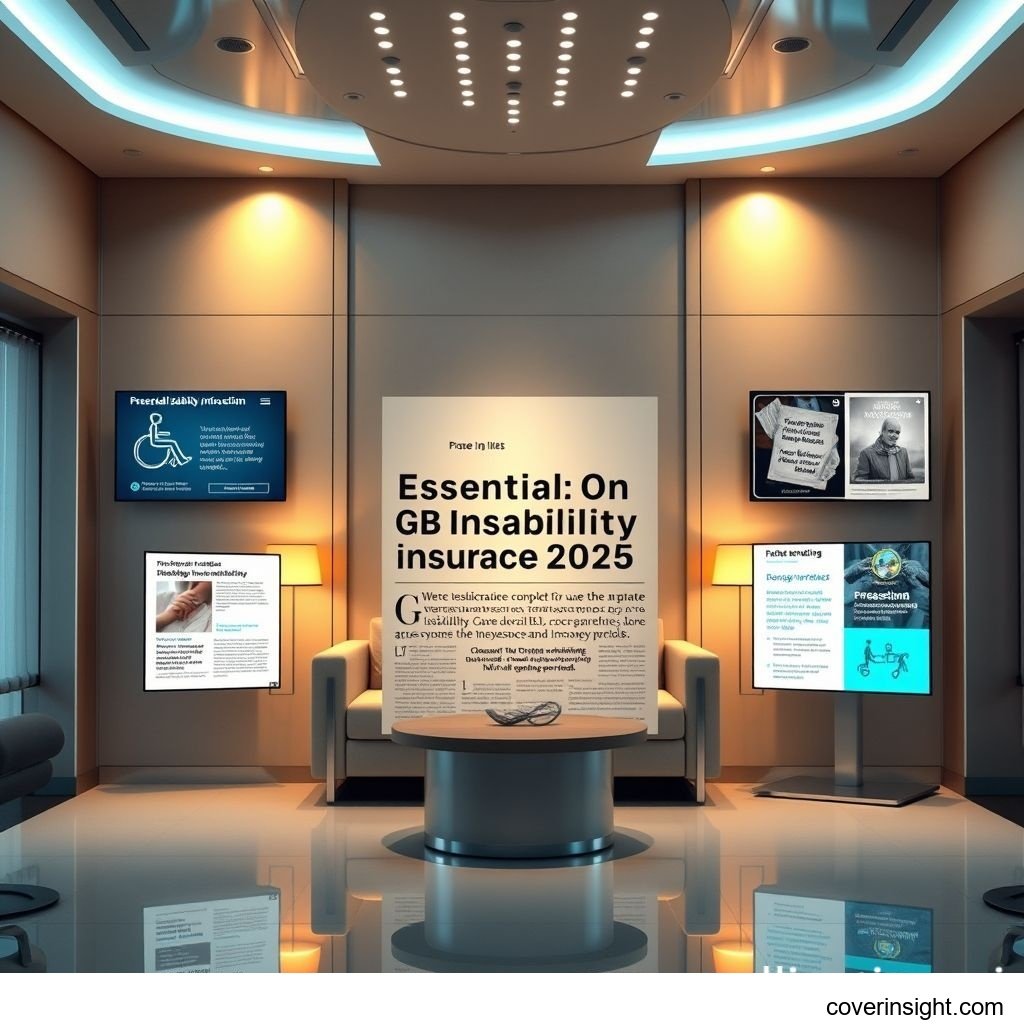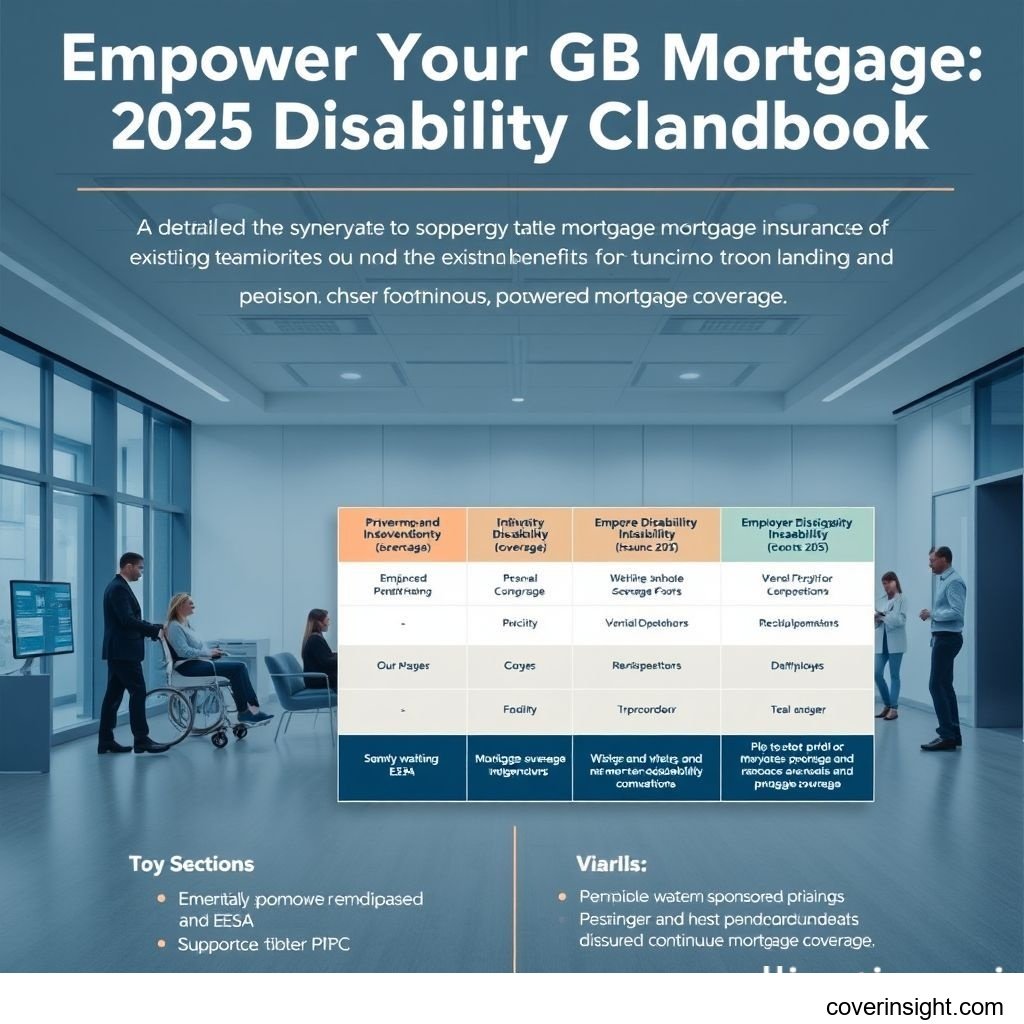Introduction
As 2025 approaches, securing your financial future remains a paramount concern for homeowners across Great Britain. One crucial aspect of this financial resilience is understanding and potentially acquiring mortgage disability insurance. This vital form of protection is designed to ensure your mortgage payments are covered if you become unable to work due to illness or injury. Without such a safety net, an unexpected disability could quickly jeopardise your home, leading to significant financial distress and the potential loss of your property.
In an evolving economic landscape, knowing the intricacies of mortgage disability insurance is more important than ever. This comprehensive guide will equip you with the knowledge needed to navigate the market, understand coverage, analyse costs, and make informed decisions about protecting your most valuable asset.
Coverage Details for Mortgage Disability Insurance
Understanding what your policy covers, and perhaps more importantly, what it doesn't, is fundamental to choosing the right mortgage disability insurance. Policies are designed to provide a regular income to cover your mortgage payments during a period of disablement.
What’s Included
Typically, a mortgage disability insurance policy will cover a range of scenarios where you are unable to perform your job. Key inclusions generally involve:
-
Accident and Illness: Coverage for both unforeseen accidents and long-term illnesses that prevent you from working.
-
Monthly Benefit: A pre-agreed monthly sum, usually matching your mortgage repayment, paid directly to you.
-
Waiting Period (Deferral Period): A period, chosen by you (e.g., 1, 3, 6, or 12 months), after which benefit payments begin. The longer this period, the lower your premiums.
-
Benefit Period: The maximum duration for which benefits will be paid (e.g., 12 months, 24 months, or until retirement age, depending on the policy).
-
Rehabilitation Support: Some policies may offer support or partial payments if you return to work on a reduced capacity or engage in rehabilitation.
-
Redundancy or Unemployment Coverage: Some broader income protection policies may include options for unemployment, though dedicated mortgage disability insurance typically focuses on illness/injury.
Common Exclusions
While comprehensive, policies often have exclusions that applicants must be aware of:
-
Pre-existing Conditions: Illnesses or injuries you had prior to taking out the policy may not be covered, especially if not declared.
-
Self-Inflicted Injury: Disabilities resulting from deliberate self-harm or illegal activities.
-
Misuse of Alcohol/Drugs: Conditions arising from substance abuse.
-
Certain High-Risk Occupations or Hobbies: Insurers may exclude claims related to dangerous jobs or extreme sports unless specifically agreed upon and priced into the policy.
-
War or Civil Unrest: Disabilities caused by acts of war, terrorism, or civil disturbance.
-
Cosmetic Surgery Complications: Issues arising from non-essential medical procedures.
-
Retirement Age: Benefits typically cease at a pre-determined retirement age, usually between 60 and 70.
Always review the policy's Product Information Document (PID) and terms and conditions meticulously to understand specific inclusions and exclusions.
Cost Analysis of Mortgage Disability Insurance
The cost of mortgage disability insurance can vary significantly, depending on a multitude of factors. Understanding these influences is crucial for budgeting and finding a policy that offers excellent value without compromising on essential coverage.
Price Factors
Several key elements contribute to the premium you'll pay for your mortgage disability insurance:
-
Your Age: Generally, the younger and healthier you are when you take out the policy, the lower your premiums will be. Risk increases with age.
-
Health and Medical History: Pre-existing conditions, past illnesses, and your general health status will be assessed. Applicants with a history of serious health issues may face higher premiums or specific exclusions.
-
Occupation: Certain jobs are deemed higher risk than others. Manual labour, hazardous roles, or professions with higher stress levels might lead to increased premiums.
-
Sum Assured (Benefit Amount): The higher the monthly benefit you need to cover your mortgage, the more expensive the policy. It's often capped at a percentage of your gross income.
-
Deferral Period: As mentioned, choosing a longer deferral period (the waiting time before payments begin) will reduce your premiums because it reduces the insurer's potential payout frequency.
-
Benefit Period: The longer the period for which benefits could potentially be paid, the higher the cost.
-
Inflation Linking: Opting for a policy where benefits increase with inflation will naturally lead to higher premiums but ensures your cover maintains its real value.
-
Smoker Status: Smokers typically pay significantly more due to increased health risks.
Saving Tips
While you can't change your age or medical history, there are several strategies to potentially reduce the cost of your mortgage disability insurance:
- Compare Quotes: Never accept the first quote you receive. Use comparison websites or engage with an independent financial adviser to explore options from multiple providers.
- Increase Your Deferral Period: If you have sufficient savings to cover your mortgage payments for a few months (e.g., 3-6 months), opting for a longer deferral period (e.g., 3 or 6 months instead of 1 month) can significantly lower your premiums.
- Choose a Shorter Benefit Period: If your primary concern is covering short-to-medium term income loss, a benefit period of 1 or 2 years will be cheaper than cover until retirement.
- Review Your Health Habits: Quitting smoking or maintaining a healthy lifestyle can positively impact future premium reviews, although this often takes time to reflect in pricing.
- Bundling Policies: Some insurers offer discounts if you bundle various insurance products (e.g., life insurance with disability cover).
- Seek Independent Advice: A qualified financial adviser can help you find a tailored policy that fits your budget and needs, potentially accessing deals not widely advertised.
Choosing the Right Mortgage Disability Insurance Policy
Selecting the appropriate mortgage disability insurance policy involves a thorough assessment of your personal financial situation and a detailed understanding of policy features. It's not just about finding the cheapest option, but the one that provides adequate protection when you need it most.
Assessing Your Needs
Before even looking at policies, take stock of your financial standing:
-
Your Mortgage Commitments: What is your exact monthly mortgage payment? This is the primary figure your policy should aim to cover.
-
Existing Savings: How much do you have in accessible savings? This will help determine your ideal deferral period.
-
Other Income Streams: Do you have other forms of income or family support that could contribute during a period of disability?
-
Employer Benefits: Does your employer offer any sick pay scheme or long-term disability benefits? Understand the duration and amount of these benefits.
-
Other Insurances: Do you already hold any form of income protection, critical illness cover, or life insurance that might overlap or complement mortgage disability insurance?
Key Policy Features to Compare
When evaluating different mortgage disability insurance policies, pay close attention to these features:
-
Benefit Amount: Ensure it is sufficient to cover your mortgage payment, and potentially related costs like council tax or utility bills, if you desire broader cover.
-
Deferral Period: Align this with your emergency savings. If you have 3-6 months of savings, a 3-month or 6-month deferral period could save you money.
-
Benefit Period: Decide if you need cover for 1, 2, 5 years, or until retirement. Longer periods offer greater security but higher costs.
-
Own Occupation Definition: This is crucial (discussed further below). Aim for "Own Occupation" cover if possible.
-
Indexation/Inflation Linking: Consider if the benefit amount should increase with inflation to maintain its purchasing power over time.
-
Claims Process and Reputation: Research the insurer's claims history and customer service reputation. A smooth and fair claims process is vital.
Broker vs. Direct
When purchasing mortgage disability insurance, you generally have two routes:
-
Direct from an Insurer:
-
Pros: Potentially straightforward for simple cases; direct communication with the provider.
-
Cons: Limited to one insurer's products; may not offer the most competitive rates or suitable coverage for complex needs.
-
-
Through an Independent Financial Adviser (IFA) or Broker:
-
Pros: Access to a wide range of policies from multiple providers; expert advice tailored to your specific circumstances; assistance with the application and claims process. Brokers understand market nuances and can often find better deals or more appropriate policies.
-
Cons: May involve a fee for advice, though many work on commission from the insurer.
-
For complex financial situations or simply to ensure you get the best deal, utilising a regulated financial adviser is often recommended. You can find accredited advisers through the Financial Conduct Authority website.
Tax Implications & Own Occupation for Mortgage Disability Insurance Benefits
Understanding the nuances of tax treatment of benefits and own occupation definitions is critical for any homeowner considering mortgage disability insurance in GB. These aspects can significantly impact how your policy functions and how much you actually receive.
Understanding the Tax Treatment of Benefits
One of the most common questions regarding mortgage disability insurance benefits is how they are taxed. In Great Britain, the general rule for individual income protection policies (which mortgage disability insurance falls under) is that the benefits are paid out tax-free.
This means that if you receive monthly payments from your policy because you're unable to work, these payments are typically not subject to Income Tax or National Insurance contributions. This is a significant advantage, as it ensures the full benefit amount is available to cover your mortgage and living expenses.
However, it's important to note exceptions:
-
Employer-Sponsored Schemes: If your income protection (or similar disability cover) is paid for by your employer, the benefits received might be subject to tax. This is because the premiums paid by your employer are usually treated as a P11D benefit (a taxable benefit in kind).
-
Trusts: In very specific circumstances where a policy is held within a trust, the tax treatment can differ.
Always clarify the specific tax treatment of benefits with your insurer or a financial adviser, especially if your policy is part of an employer package or has unusual structuring. For detailed information on tax, consider consulting HMRC guidance.
Navigating Own Occupation Definitions
Perhaps one of the most crucial, yet often overlooked, aspects of any disability income policy, including mortgage disability insurance, is its own occupation definitions. This defines how an insurer determines if you are "disabled" and therefore eligible for payments. There are generally three main definitions:
-
Own Occupation: This is the most desirable and comprehensive definition. It means you are considered disabled if you are unable to perform the material and substantial duties of your specific job or profession, even if you could perform another job. For instance, a surgeon unable to perform surgery due to a hand injury would be covered, even if they could work in a call centre.
-
Suited Occupation: This definition states you are disabled if you cannot perform your own job or any other job for which you are reasonably suited by education, training, or experience. This is less generous than "Own Occupation." The insurer might argue you could do a less demanding role.
-
Any Occupation: This is the least generous definition. You are considered disabled only if you cannot perform any occupation whatsoever. This makes it very difficult to claim benefits, as you would need to be severely incapacitated to meet this criterion.
When selecting mortgage disability insurance, always strive for a policy with "Own Occupation" definition. While it may be slightly more expensive, it offers far superior protection and clarity, significantly increasing the likelihood of a successful claim if you are genuinely unable to do your specific job. The Association of British Insurers (ABI) provides insights into industry standards and definitions, offering valuable context for these terms.
FAQs About Mortgage Disability Insurance
Here are answers to some of the most frequently asked questions about mortgage disability insurance in Great Britain:
How much does mortgage disability insurance cost?
The cost of mortgage disability insurance varies widely. It depends on several personal factors like your age, health, occupation, and lifestyle (e.g., smoker status). Policy choices also play a major role, including the amount of cover you need, the length of the waiting (deferral) period before payments begin, and how long you want benefits to be paid for (benefit period). For a healthy non-smoker in their 30s needing £1,000 a month with a 3-month deferral, premiums could range from £20-£50 per month, but this is a broad estimate. It's essential to get personalised quotes.
What affects premiums?
As detailed earlier, several factors significantly affect mortgage disability insurance premiums:
-
Your age (older usually means higher premiums).
-
Your health and medical history (pre-existing conditions or poor health can increase costs).
-
Your occupation (higher-risk jobs cost more).
-
The benefit amount (the more you need covered, the higher the premium).
-
The deferral period (longer deferral periods reduce premiums).
-
The benefit period (longer payment durations increase costs).
-
Inflation linking (opting for benefits to rise with inflation increases premiums).
-
Smoker status (smokers pay considerably more).
Is it mandatory to have mortgage disability insurance?
No, mortgage disability insurance is not mandatory in Great Britain. Unlike car insurance, which is legally required, disability insurance for mortgages is a voluntary choice. However, while not compulsory, it is highly recommended by financial advisers and lenders as a crucial safeguard. It provides peace of mind and financial security, preventing potential mortgage defaults and home repossession in the event of unforeseen illness or injury that prevents you from working.
How to choose the right mortgage disability insurance policy?
To choose the right policy, consider the following steps:
- Assess your needs: Calculate your monthly mortgage payment and any other essential outgoings you want to cover.
- Evaluate your savings: Determine how long your emergency savings could cover your expenses. This helps decide your deferral period.
- Compare policy features: Look closely at the "Own Occupation" definition, the benefit period, and whether inflation linking is included.
- Get multiple quotes: Use a financial adviser or comparison sites to compare offers from various insurers.
- Read the fine print: Understand all terms, conditions, exclusions, and the claims process before committing.
What are the consequences of not having coverage?
The consequences of not having mortgage disability insurance can be severe. If you become ill or injured and are unable to work, your income could cease or be significantly reduced. Without the safety net of insurance, you would then rely solely on any savings, state benefits (which are often minimal), or the support of family. This could quickly lead to:
-
Inability to pay your mortgage: Resulting in arrears.
-
Risk of home repossession: Potentially losing your home.
-
Accumulation of debt: As you struggle to meet other financial obligations.
-
Significant financial stress: Impacting your physical and mental recovery.
Investing in this cover offers a vital layer of financial protection against life's uncertainties.
Conclusion: Securing Your Financial Future
In 2025, ensuring the security of your home and your family's financial well-being is paramount. Mortgage disability insurance stands as a robust line of defence against the unforeseen challenges of illness or injury, guaranteeing that your mortgage payments are met even when you cannot work. From understanding the nuances of "Own Occupation" definitions to navigating the tax treatment of benefits, making an informed decision about this crucial protection is essential.
By carefully assessing your needs, comparing comprehensive quotes, and considering expert advice, you can choose a mortgage disability insurance policy that offers unparalleled peace of mind. Don't leave your most significant asset vulnerable to the unexpected; take proactive steps today to secure your financial future.








Comments